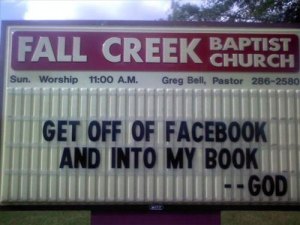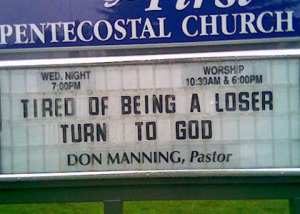I’m prone to living my life in a way where I don’t have to talk to people.
For instance, I resort to e-mail over a phone call and I can be really stubborn with this. Sometimes there’ll be minor issues that need to be taken care of (school schedule changes, internet bill questions, calling to make a doctor’s appointment) and I’ll totally avoid these calls. I’ll email if possible, but if not, then I usually just ask Julie to make the call (this can’t be a healthy marital move, but I will say, she’s so much better (and meaner!) at talking to the obnoxious internet people).
I’m seeing that my stubbornness with such things can be quite foolish. I could save myself (and Julie) time and stress by calling and crossing things off the checklist faster. I simply need to have more responsibility and do these types of things.
I’m also prone to living my life in a way where I don’t have to know people.
I’ll talk to the people I want to talk to and even pursue certain people that I want to pursue. But I’m not prone to actually getting to know people. I tend to keep people at arm’s length and I lack intentionality in seeking to get to know people’s backgrounds, interests, views, and joys.
Living in a way where I don’t have to talk to annoying business people on the phone is silly, but living in a way in which I don’t have to know people is downright unhealthy. The consequences of the first are minor stresses and perhaps an extra $30 on the monthly bill, but the consequences of the latter are a lack of relationships and community.
Let’s zero in on the latter, because there’s clearly much more to zero in on. Why am I like this — prone to not get to know people?
Here are a couple reasons that jump out:
Reason #1: We live in a world of distractions. I frequently walk the streets of Chicago (where I’m a graduate student) and I often find myself dodging fellow pedestrians who are entrenched in the latest app on their I-Phone.
Now, I better not dare act like I’m never one of those swerving pedestrians who almost run into a sweet old lady or trip and fall in front of a taxi. I frequently find myself texting as I stroll the city streets. Think about that for a second. If I’m texting while walking through a metropolis (where there are thousands of other people and things to look at), you better believe I’m busy probing my phone, Facebook, Twitter, my fantasy sports teams, and ESPN.com whenever I have a free window of time elsewhere. My mind runs towards this clutter. I gotta have it and I don’t know why, because the thing is I know that I don’t really gotta have it but I still keep running towards it.
I’m rambling.
What I’m trying to get at is this: we can live entire days completely immersed in our own little bubbles of social media with a little work thrown in on the side. We may know people through one-liners on the internet, but all of these distractions pull us away from intentional relationships. We can always find a way to busy ourselves and it takes away from actually stopping and talking to people.
Reason #2: Relationships are work, and as much as I don’t want to admit this, I often don’t want to put in the time. Life is about me and allowing other people to enter my world is often inconvenient.
We don’t just get to know people automatically. It takes effort — asking questions, listening (which can be really hard) to people’s stories, inviting people over, making plans for an event and then following through with it, and committing to doing these sorts of things frequently, because we don’t just get to know someone on one occasion, but over time is when guards are let down, vulnerabilities are exposed, and a true, intentional relationship begins to blossom.
I want that but I don’t want that, and that’s what I don’t like. My life’s grown accustomed to being centered upon me, and I know that my selfishness needs to be peeled back for these types of relationships to develop and grow.
Therefore, I’m going to try to end this cycle of living without really knowing anybody. And I’ll certainly fail at this time and time again. But it’s time for me to take some responsibility with this. I’m not saying all the internet distractions are being thrown out the door, but they’re going to need to be limited. If anything, those are the things that need to be held at arm’s length, not people.
And I hope I can begin to step out of my inwardly consumed shell and begin to see people, to really see them, as people who God made just like me — with stories, fears, hopes, dreams, and futures.
I know one thing: the people who’ve intentionally invested in me have encouraged and instilled me with joy in a way in which I’ll be forever grateful.
Should my life seek to reciprocate this?















